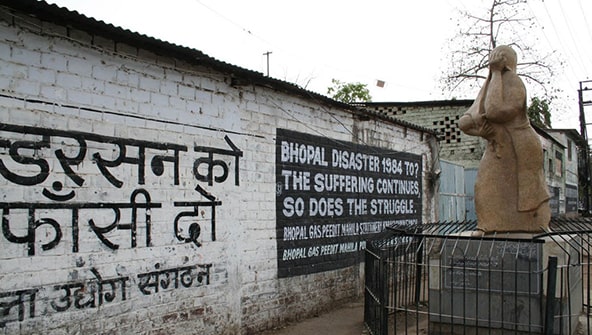Exactly thirty years ago, the deadliest industrial accident of all time took place. On December 3, 1984, a leak in a pesticide plant caused the release of 40 tons of methyl isocyanate into the air in the city of Bhopal, India. About 4,000 people were killed outright, and another 15,000 passed away in the weeks and months that followed. In total, it is estimated that 500,000 people suffered at least some degree of exposure to the chemical. The majority owner of the plant paid a half-billion dollar settlement in 1989, and ongoing civil and criminal cases have resulted in convictions announced as recently as 2010. The exact cause of the leak still remains under debate to this day.
The disaster at Bhopal brought chemical safety to the forefront of the world’s attention. In the United States, it resulted in several government actions including the creation of the Emergency Planning and Community Right-to-Know Act (EPCRA) in 1986 — which increased requirements for public awareness of hazardous chemicals and related emergency planning — and the authorization of the Chemical Safety Board (CSB) in 1990 as part of the Clean Air Act amendments. The CSB is a federal agency charged with investigating the causes of industrial chemical accidents with the goal of preventing their recurrence.
While the Bhopal disaster took place more than a generation ago, its regulatory impacts are still being felt today. In fact, just this week the CSB is announced that it is making the modernization of Process Safety Management (PSM) regulations #2 on its list of Most Wanted Safety Improvements. It believes that implementation of its recommendations around PSM would result in a significant increase in chemical safety.
In a prepared statement, CSB Chairperson Rafael Moure-Eraso said: “As Chairperson of the CSB I see this as an important opportunity to advance national process safety management reform by advocating for this issue as part of the board’s Most Wanted Chemical Safety Improvements Program. My hope is that reform will help to prevent future catastrophic accidents.”
In addition to the ongoing work of regulatory entities, there are signs that the impact of Bhopal will continue to be felt on a cultural level. Last month saw the release of Bhopal: A Prayer for Rain, a new film about the disaster starring Martin Sheen, Kal Penn, and Mischa Barton.
The anniversary of the disaster is also being commemorated by human rights organizations and by educational institutions around the world, and is being covered by the international media.
While there has never been another disaster equal to Bhopal in terms of human injury and loss of life, major chemical and industrial events continue to shape the face of government action and regulation. In the U.S. alone in the past decade, we’ve seen the Texas City refinery explosion in 2005, the fertilizer explosion in West Texas in 2013, and the release of 4-methylcyclohexanemethanol into West Virginia waterways in 2014. In each of these cases, state and federal government used these occasions to propose or pass new safety controls in the form of legislation or executive actions. As awareness of the need for chemical safety continues to percolate throughout our culture, look for this trend to continue.
